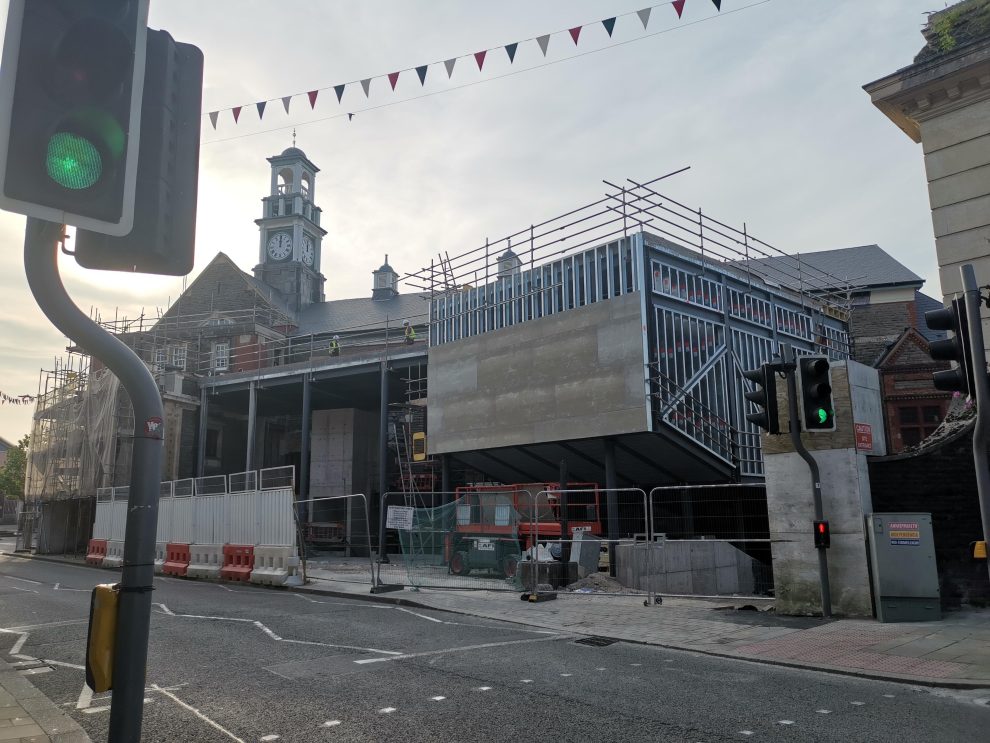THE COST of refurbishing an “iconic” town hall in Bridgend county borough has once again increased by a further £1.17 million.
It is the second time the cost of the contract for the Maesteg Town Hall refurbishment has gone up in as many years, following a £1.5 million increase in November of 2022, now taking the total price to almost £10 million.
The Grade two listed building which has been described as a focal point for arts and community activity in the Llynfi valley is heading towards the latest stage of its extensive upgrades, which have been on-going for around four years.
Its completion will see the building returned to its former glory, and will feature a new glass atrium, studio theatre and cinema space, as well as a café and mezzanine bar, with heritage centre and library.
However, the latest increase in funding drew intense scrutiny from members of Bridgend Council, after it was approved at a full council meeting on November 22, with a further £1,173,530 million being taken from the Waterton Depot scheme, originally designated for refurbishments at the council highways depot.
Members heard how the additional funding would be needed to treat sections of structural dry rot which were discovered in the 141-year-old building, while also taking preventative action to safeguard against any future rot issues.
It takes the current costs of the town hall to an assessed £9,958,660, compared to an initial contract value of £6,199,387, though officers said the building surveys that were done, were done to the greatest extent that they could have been, with the latest issues only being discovered as things were stripped away for renovation.
Cllr Rhys Goode said: “We remain committed as a cabinet to finishing this project. This project not only benefits Maesteg, it will benefit the entire borough and will maintain an important heritage site for generations to come.
“However, you will all be aware the council faces significant financial pressures, and I want to be very clear as the cabinet member responsible, there is no blank cheque here for our contractors.”
The group leader of Bridgend County Independents, Cllr Amanda Williams, as well as Cllr Alex Williams and Cllr Freya Bletsoe issued a joint statement shortly after the meeting highlighting concerns over the escalating costs.
They said: “We all want this project to be completed and for this iconic building to open at the earliest opportunity so that the people of Maesteg can make the most of the positive socio-economic and cultural benefits which the regeneration of Maesteg Town Hall will bring to the town and the whole Llynfi Valley.
“However, as scrutineers of the BCBC administration, we have a duty to ensure that public funds are invested in a responsible way to achieve value for money for the public purse. We must also express our concern and disappointment that this historic grade two listed building is still not open to the public, four years after the beginning of the project and at a cost which is pushing £10 million.
“While we support the enhancements to the project which were commissioned by the county council, including the refurbishment of the clock tower, the unforeseen issues of extensive dry rot and lime plastering works are nothing new.
“The county council reported these issues to councillors in 2022 and confirmed that the majority of the high-risk areas of works had been completed and that the likelihood of further high-cost unforeseen elements being discovered was “minimal” because they had done the majority of de-constructive and repair works, and that they were getting the building ready for opening in Summer, 2023.
“They went on to say that there is confidence that the project would complete comfortably within the secured financial envelope of the project and that it was anticipated that some money would be returned to the council’s capital programme. In short, this overall contract envelope was described as a “worst case scenario” but one year later, we now find that the building is still not complete and an additional £1.173 million of interim funding is required. Where does this stop?”
The motion to agree the increased funding was passed by members following a vote, with officers adding that they had also submitted an application for National Lottery Heritage Funding, meaning the requested figure could be lowered if this was successful.



















